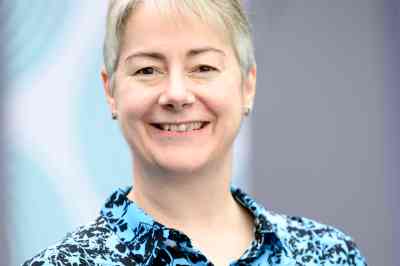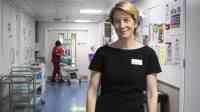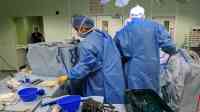Sexual violence ‘is tolerated by NHS’
Women face an ‘embedded culture of misogyny’ in the health service, a report based on the testimony of 150 staff says
Male doctors assault female colleagues on hospital wards due to “systemic and institutional sexual violence” that is “tolerated” within the NHS, a report says.
An investigation by the campaign group Surviving in Scrubs found that an “embedded and normalised culture of misogyny” was harming patient care and putting safety at risk.
They compiled a report based on the anonymous testimonies of 150 healthcare staff, mainly female doctors, who have experienced sexism, sexual assault or rape in the workplace.
Three quarters of the perpetrators were doctors, most of them male consultants. The report warned that a “culture of tolerance” allows staff who sexually assault colleagues to keep working unchallenged in the NHS.
Senior doctors were described as “untouchable” and able to “act with impunity”, with one surgeon referred to as the “Jimmy Savile of the surgical community” because his behaviour was such common knowledge.
Advertisement
Meanwhile, a “power imbalance inherent within medical hierarchies” means that consultants target younger colleagues including junior doctors and medical students.
The report is based on 174 incidents of sexism, sexual harassment and assault reported by victims, including four cases of rape and 43 incidences of sexual assault.
• Sexual assault, crude banter — what it’s like to be a female surgeon
• Female surgeons speak out about being assaulted by colleagues
Half of the incidents were in patient-facing environments, such as hospital clinics and hospital wards. One in ten took place in doctors’ offices. Nearly half of the perpetrators worked in surgery.
The report said healthcare settings “created potentially opportunities for sexual assault”. A large number of women reported being sexually assaulted while being scrubbed in for an operation, meaning “victims were unable to use their hands to protect themselves or move away from the perpetrator”.
One recalled being sexually propositioned by a male consultant who was covered in a female patient’s blood at the end of surgery,
The report said that sexism within medicine began during training, describing how a gynaecology consultant would tell medical students that the “only purpose of a vagina was for sex”.

It said that the sexist culture of “male dominance and superiority” was damaging patient safety and care across the NHS. “Women healthcare workers reported their clinical judgments being questioned, decisions not taken seriously, clinical requests ignored or overly criticised and referrals refused,” it said.
Advertisement
Meanwhile, widespread sexism meant that some women were missing career opportunities in the NHS, and were discriminated against when pregnant. Those who complained about sexual assaults said they were made to feel that they should “put up and shut up”, and told not to make a fuss.
“Survivors who had experienced sexual harassment or violence reported having to protect their careers, ignoring incidents and continuing their work. They described fearing repercussions with one survivor being told not to say anything that could affect her career. Another described threats to her career from the perpetrator,” the report said.
It was written by the NHS doctors Becky Cox, Chelcie Jewitt, and Ellen McIver. Cox founded Surviving in Scrubs after experiencing sexual assault by colleagues. They have made nine recommendations, including for an independent inquiry into the culture of sexism and sexual misconduct in healthcare. They said all students should be educated on sexism and NHS managers should be trained to respond to reports of sexual misconduct.

Professor Dame Jane Dacre, former president of the Royal College of Physicians, said the culture within the NHS must “change urgently”.
She told The Times: “It feels as if we are stuck in 1948 when the NHS was set up. The NHS is understaffed and is made up of around 80 per cent women. We should not tolerate sexism and sexual assault which is undermining patient care, exacerbating the gender pay gap, and driving women away.”
Dr Jeanette Dickson, chairwoman of the Academy of Medical Royal Colleges, said the report “confirms what many of us suspected was the case”, adding: “It is apparent that we are continuing to normalise behaviour that is totally unacceptable anywhere.”
The academy’s Trainee Doctors’ Group is conducting its own investigation into the issue. Dr Matt Clarke, chairman of that committee, said: “We must lead by example and call out not just the sexism and sexual violence, but all the forms of bullying and undermining that we see every day in the medical profession, and be supported to do so.
Advertisement
“Too often we do not feel able to speak up out of fear of reprisals, and it can feel safer to just get on with the job. All forms of harassment are unacceptable and cause lasting impacts on individuals, recruitment and retention. It’s for the profession as a whole to make sure we put a stop to it.”
The NHS was contacted and invited to comment.
‘No one should experience this in the workplace’
It started as hushed conversations between female doctors, then a few brave surgeons chose to speak out in The Times. Now, thanks to the testimony of hundreds of women working in healthcare, the scale of sexism and sexual violence across the NHS is being exposed (Eleanor Hayward writes).
As Surviving in Scrubs’ harrowing report shows, in most cases victims are preyed on by their own male colleagues — senior doctors in positions of power, trust and authority. The problem of sexual assault in healthcare was put in the spotlight this year after a study was published in the British Journal of Surgery.
It found that two thirds of women working in surgery had been sexually harassed by a colleague in or around the operating theatre. There were 11 instances of rape reported by the 1,434 surgeons who participated in the study.
It is increasingly clear that sexual assault is not confined to male-dominated specialties such as surgery, with all branches of medicine and healthcare affected. Not only does this cause lifelong trauma for women, sometimes wrecking their careers, the widespread sexism also puts patients at risk.
Health officials are taking action, with Amanda Pritchard, the chief executive of NHS England, promising a “zero-tolerance approach” to perpetrators of sexism and sexual violence. Campaigners say further action, including an independent inquiry, is needed and the voices of survivors must be put at the forefront of bringing about changes.
Advertisement
Dr Binta Sultan, chairwoman of NHS England’s National Clinical Network of Sexual Assault and Abuse Services, said: “No one should experience sexism, sexual harassment, or sexual assault in the workplace — it is totally unacceptable. The NHS is taking steps to ensure that healthcare environments are safe for staff and patients.”
She said that the NHS’s first sexual safety charter, which had been produced with the help of people “with lived experience”, would provide “more support and clear reporting mechanisms to those who have suffered inappropriate behaviour”.
The Times investigates the crisis facing the health and social care system in England. Find out more about The Times Health Commission.




